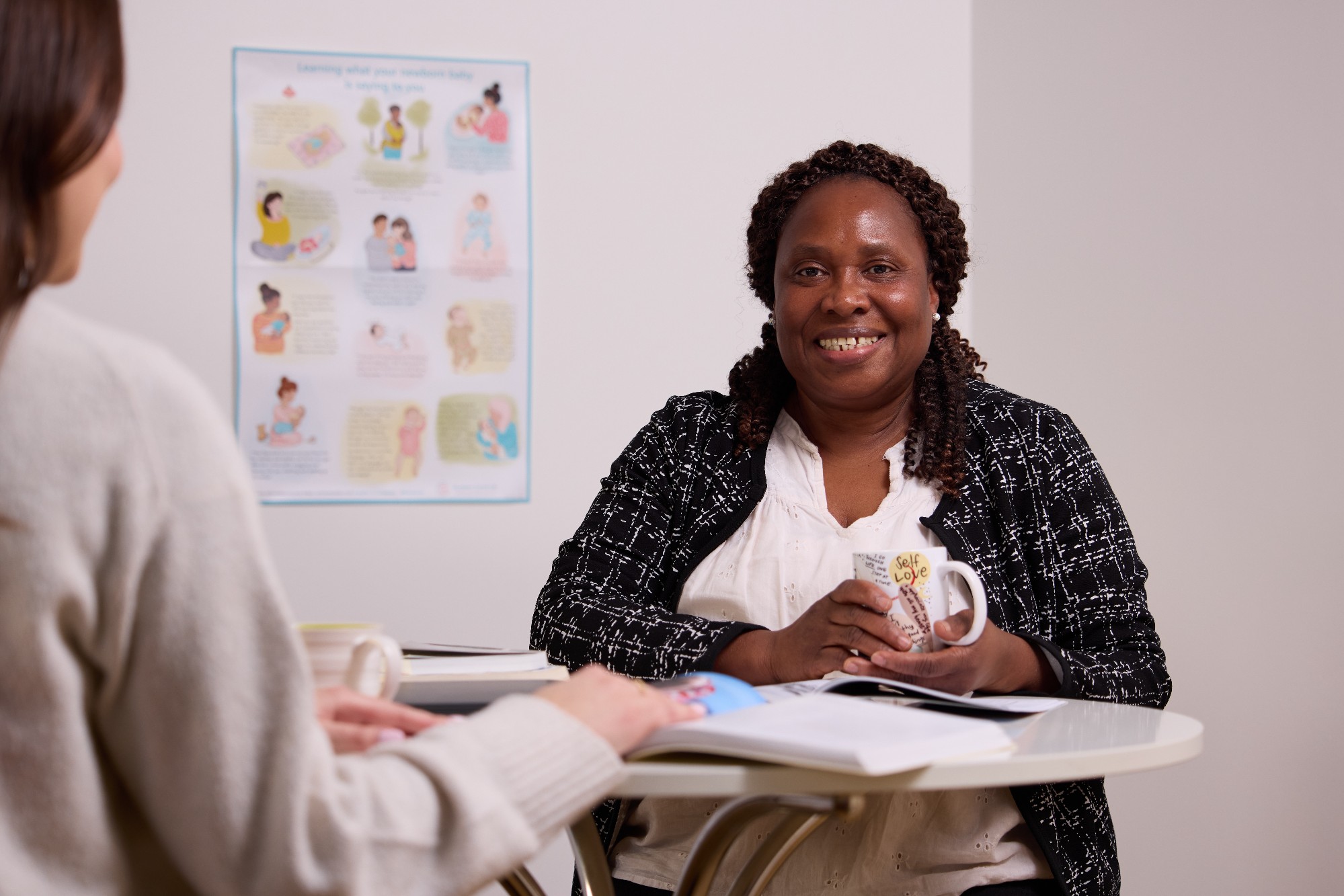Published on: 29th October 2025
For Black History Month, Rugie Kamara, parent infant mental health practitioner, and Jane Harris, child psychotherapist, discussed building relationships and creative ways to help parents and babies from different communities.
 Rugie talks about breaking down language barriers, helping colleagues to understand new cultures, and how inspiration from Tina Turner will help new mums in Heywood, Middleton and Rochdale.
Rugie talks about breaking down language barriers, helping colleagues to understand new cultures, and how inspiration from Tina Turner will help new mums in Heywood, Middleton and Rochdale.
“I came to the UK in 1991 from Sierra Leone,” begins Rugie, parent infant mental health practitioner with Heywood, Middleton and Rochdale parent infant mental health service. “I’ve done all my studies in the UK, and I’ve had my son here as well. Black History Month has become more resonant for me.”
Having started her career as a nurse and later qualifying as a health visitor, Rugie has spent many years working within the NHS—a place she describes as a natural home for many in her community. “I feel very proud to be part of British society, I feel very proud to be working in the NHS, I feel very proud to be able to get to this point in my career because it’s been a long time.”
As the only Black member of her team, Rugie reflects on the importance of representation and cultural exchange. “I feel very comfortable with everyone. I think I am standing ‘firm in power and pride’ of being part of this team. Working with colleagues, I’ve been able to give them an understanding of the African culture and other cultures as well.”
By building these strong, positive relationships between colleagues, the team can better support parents to developing a healthy, nurturing relationships with their baby.
Rugie's insights into maternity care also highlight the need for cultural sensitivity and better communication. She explains how language barriers and cultural differences can lead to misunderstandings in labour wards.
“A woman might be in labour and not making any noise at all, but they’re struggling, they’re in pain. Sometimes hospital staff might overlook this because they think their pain threshold is very high. In many cases that is not the case, that woman will be very anxious, very worried about their baby, not knowing how to express themselves and the type of pain they’re in.”
She advocates for simple, practical solutions: “Make use of the interpreting service as much as possible. Break down the communication for the mother. Write a simple message like ‘are you okay?’ or explain what the painkiller is and what it does.”
“Women who have come from other parts of the world may not know anything about pain relief during labour, or epidurals – they don’t know what it is, and they’re probably worried as well that something might happen to the baby if they take anything to reduce the pain. If we don’t ask the question to ourselves – why is that mum worried about taking the pain relief? It means we are leaving that mum to struggle for hours on end.”
“I think the difficulty as well is that there is a lack of black professionals in certain areas. Seeing someone with the same colour can help, they can feel relieved and more relaxed and able to ask questions.”
Rugie also emphasises the emotional impact of childbirth experiences on both mother and baby. “It’s not just one person, we’re dealing with two people. That baby’s experience, even in the womb, continues when the baby’s born. If the mother feels sad, low, anxious, that is going to have an impact on the baby as well.”
Isolation is another challenge she highlights, without friends and family who would usually help when someone is struggling or experiencing mental health issues. “Women find themselves in a different country where there’s no mum, no dad, no supporting family and friends. Depending on where you come from in Africa, we always say, ‘It takes a village to raise a child.’”
“If they don’t know where and how to seek support, don’t know the system they won’t know how to access services. Just asking the right questions [as professionals] can make a big difference.”
Rugie also recently trained in a new initiative called Singing Mamas, believing in the power of music to heal and connect. “It’s a group to support mothers through music when mum is stressed and has other things going on. The babies are going to be there too—they can sing and dance as well.”
“You don’t need a beautiful voice, you just come as you are and get the songs out. It’s a form of socialising, meeting other parents, and hopefully going home feeling good.”
When asked about her inspiration, Rugie doesn’t hesitate: “Tina Turner. I just love the woman. She was so resilient. Everything she’s been through, she never let that affect her. She progressed her career. I know I’m a legend for myself, but with Tina, she is my legend!”
Our parent infant mental health services help you to build a healthy relationship with your baby. We work with you during pregnancy, and with you and your baby up to two years old.
Read more about the service at: Heywood, Middleton and Rochdale parent infant mental health service :: Pennine Care NHS Foundation Trust